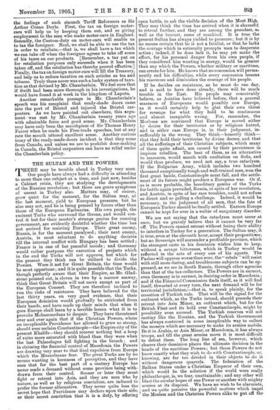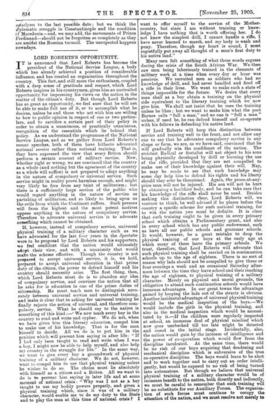If be decides on resistance, as he must do one
day, and is said to have done already, there will be much trouble in the East. His people may conceivably believe, as Asiatics have believed before, that a general massacre of Europeans would. possibly cow Europe, as it would certainly help to glut their own thirst for revenge for what they hold to be continuous and almost inexpiable wrong.. For, remember, the Moslems are convinced that Europe is moved either by desire for their territories or by religious hatred, and in either case .Europe is, in their judgment, in- sufferably in the wrong. They think—honestly think— that they hold their territories by divine decree, and that all the sufferings of their Christian subjects, which many of them quite admit, are caused by their persistence in impious rebellion. The best of them, as an alternative to massacre, would march with exultation on Sofia, and would thus produce, we need not say, a true cataclysm. If the Bulgarian Army, which includes two hundred thousand exceptionally tough and well-trained men, won the first great battle, Constantinople must fall, and the settle- ment of its future might produce a European war. Or if, as is more probable, the hereditary genius of the Turks for battle again prevailed, Russia, in spite of her revolution, and Austria, in spite of her race troubles, could not refuse so direct and so galling a challenge. Indeed, it would be necessary, in the judgment of all men, that the fate of European Turkey should be finally settled. Eastern Europe cannot be kept for ever in a welter of sanguinary disorder.
We are not saying that the cataclysm must occur at once, but we gravely believe that it cannot be very far off. The Powers cannot retreat without losing their ability to interfere in Turkey for a generation. The Sultan may, it is true, even at the eleventh hour, accept their propositions; but no Sovereign will surrender a profitable province, which the strongest caste in his dominion wishes him to keep, without a savage bitterness, which in Turkey would be reflected in the acts of every one of his • agents. The Pashas will oppress worse than ever, the" rebels "will resist with still more daring, and troublesome subjects can be op- pressed, as we see in South Russia, through other agencies than that of the tax-collectors. The Powers are in earnest, even Germany is in earnest, in desiring order in Macedonia ; and if the Financial Commission finds itself, as it will find itself, thwarted at every turn, the next demand will be for territorial jurisdiction,:—that is, to speak plainly, for the cessation of Turkish rule. That will be the signal for the outburst which, as the Turks intend, should precede their retreat into Asia Minor, an outburst which, but for the British Fleet and its hold over Constantinople, might by possibility even succeed. The Turkish reserves will not mutiny like the Russian, and the Turkish Government has always contrived in some inexplicable way to collect the moneys which are necessary to make its armies mobile. Be it in Arabia, or Asia Minor, or Macedonia, it has always troops, and till the great armies move it is most difficult to defeat them. The long line of sea, however, which cleaves their dominion places the ultimate decision in the hands of the maritime Powers ; but those Powers do not know exactly what they wish to do with Constantinople, or, knowing, are far too divided in their objects to do it without dangerous quarrels. The federation of the Balkan States under a, Christian Emperor of their own, -which would be the solution if the world were really philanthropic, is, we fear, unattainable; and any other will blast the secular hopes of one Power or another with mighty armies at its disposal. We have no wish to be alarmists, and we quite perceive the powerful motives which impel the Moslem and the Christian Powers alike to put off the lysm to the last possible date ; but we think the plomatic struggle in Constantinople and the condition of Macedonia—and, we may add, the movements of Prince Ferdinand—should not be forgotten so completely as they are amidst the Russian turmoil. The unexpected happens nowadays.
LORD ROBERTS'S OPPORTUNITY.
IT is announced that Lord Roberts has become the president of the National Service League, a body which has already achieved a position of considerable influence, and has created an organisation throughout the country. This fact, and still more the enthusiasm, coupled with a deep sense of gratitude and respect, which Lord Roberts inspires in his countrymen, gives him an unrivalled opportunity for impressing his views on the nation in the matter of the citizen's duty. But though Lord Roberts has so great an opportunity, we feel sure that he will not be able to make full use of it, or to accomplish what he desires, unless he and those who act with him are willing to bow to public opinion in respect of one or two particu- lars, and to sacrifice a certain part of their policy in order to obtain a unanimous, or practically unanimous, recognition of the essentials which lie behind that policy. As we understand the programme of the National Service League, and as we gather from Lord Roberts's recent speeches, both of them have hitherto advocated national service rather than national training. That is, they have expressed the view that every Briton should perform a certain amount of military service. Now, whether right or wrong, we are convinced that the country as a whole (and nothing but the agreement of the country as a whole will suffice) is not prepared to adopt anything in the nature of compulsory or universal service. Such service might in reality prove harmless enough, and might very likely be free from any taint of militarism ; but there is a sufficiently large section of the public who would regard anything in the nature of service as partaking of militarism, and so likely to bring upon us the evils from which the Continent suffers. Such persons will from the highest and the most potent motives oppose anything in the nature of compulsory service. Therefore to advocate universal service is to advocate something which cannot be obtained.
If, however, instead of compulsory service, universal physical training of a military character such as we have advocated. for the last four years in the Spectator were to be proposed by Lord Roberts and his supporters, we feel confident that the nation would ultimately adopt their view, and. with a unanimity that would make the scheme effective. Though the country is not prepared to accept universal service, it is, we hold, prepared to accept universal education in that prime duty of the citizen, the power to defend himself and his country should necessity arise. The first thing, then, which Lord Roberts must do is to abandon any idea of compulsory service, and convince the nation that all he asks for is education in one of the prime duties of citizenship. He must teach men to distinguish accu- rately between universal service and universal training, and make it clear that in asking for universal training he finally rejects the notion of universal, and therefore com- pulsory, service. What he should say to the nation is something of this kind. We now teach every boy in the country to read and write and cypher. We do not, when we have given him this literary education, compel him to make use of his knowledge. That is for the man himself to decide. All we do is to put him in the position which will prevent him saying in after life : "If I had. only been taught to read and write when I was a boy, I might now be able to help myself, and also help my country in the struggle for life." In the same way, we want to give every boy a groundwork of physical training of a military character. We do not, however, want to compel him to use that physical training unless he wishes to do so. The choice must lie absolutely with himself as a citizen and. a Briton. All we want to do is to prevent him saying in later life and at some moment of national crisis : "Why was I not as a boy taught to use my bodily powers properly, and given a physical training which, since it was of a military character, would enable me to do my duty to the State and to play the man at this time of national crisis ? I want to offer myself to the service of the Mother country, but since I am without training or know- ledge I have nothing that is worth offering her. I do not know the simplest drill, I cannot handle a rifle, I have never learned to march, and my body is weak and puny. Therefore, though my heart is sound, I must regretfully put away all thought of a man's first duty to his native land."





















































 Previous page
Previous page